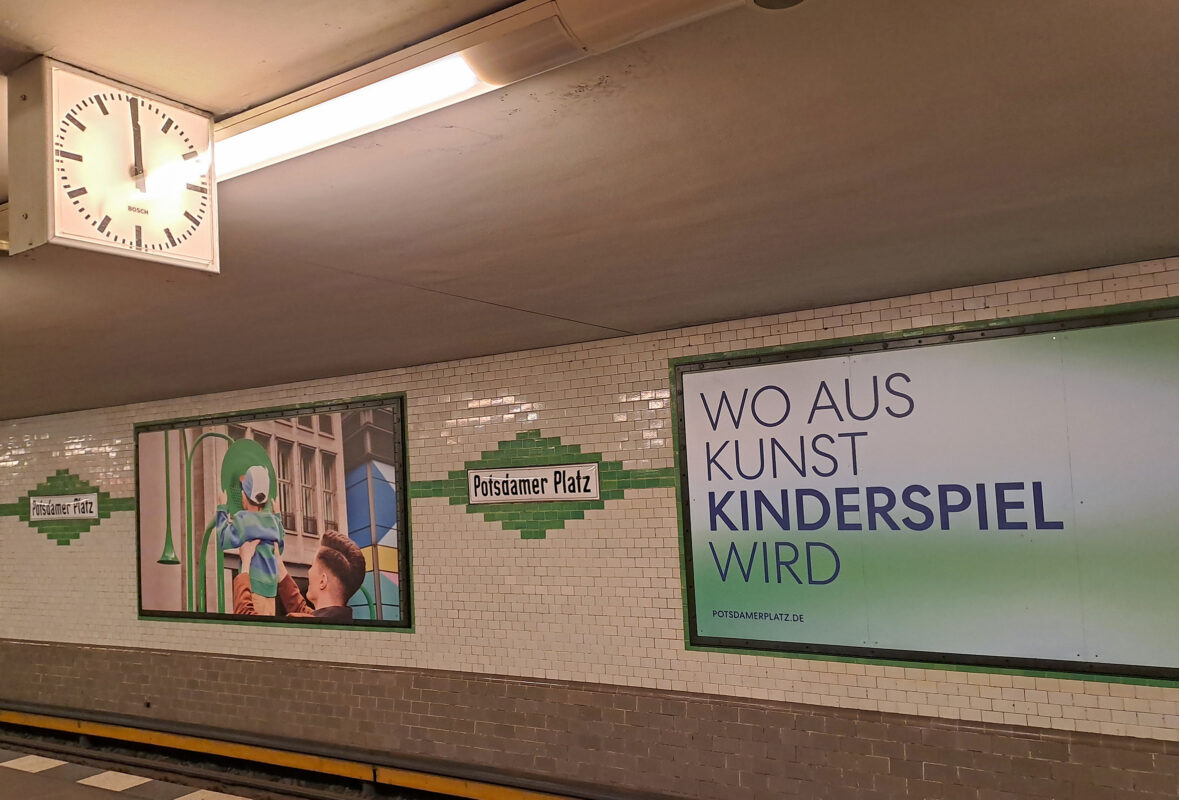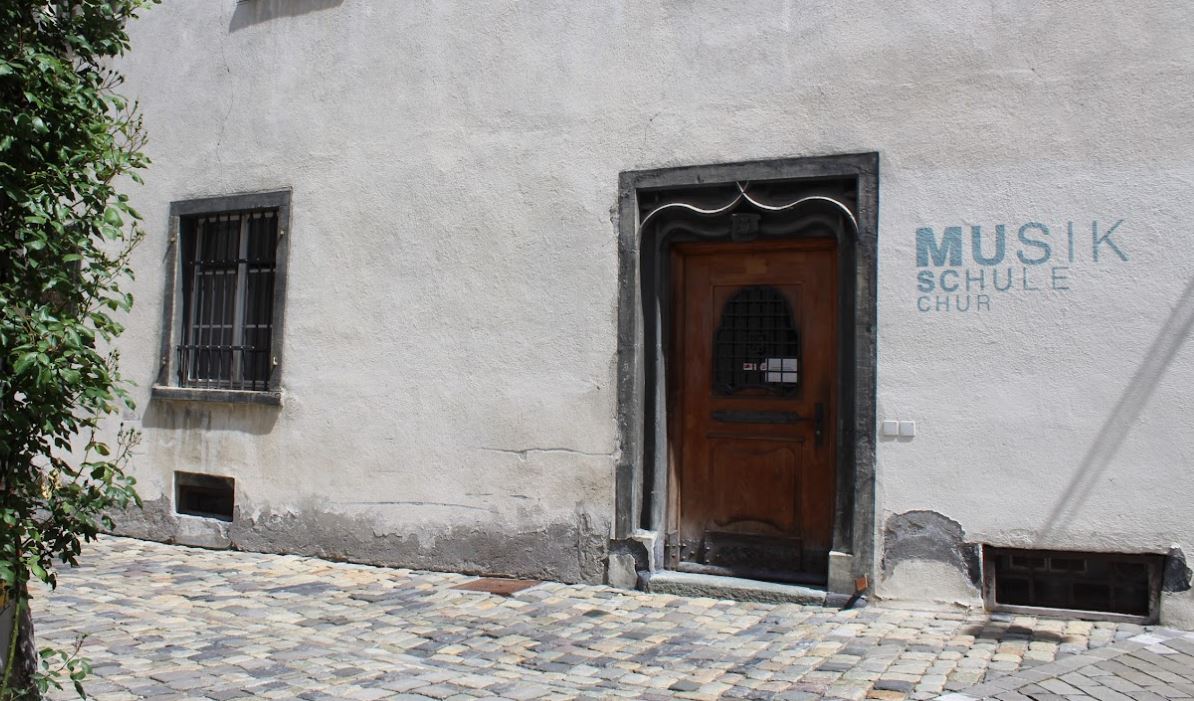From political focus to future lab
The Forum Musikalische Bildung, the flagship of the Swiss Association of Music Schools, is celebrating its anniversary. An occasion to look back over 15 years. The 10th edition will take place on January 20 and 21, 2023 at the Trafo in Baden.
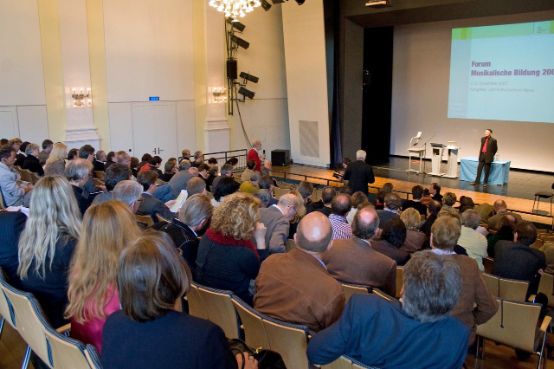
The 2023 conference will be held under the umbrella theme Transformation - digitalization and inclusion in music education. For the first time, the new President of the Swiss Association of Music Schools (VMS), Philippe Krüttli, will be chairing the conference. In addition to two keynote speeches on the first day, there will be several input presentations on specific educational topics on the second day. The best practice competition will also take place for the fourth time - an achievement that has been very well received by many music schools in recent years. As a result, the VMS has clearly raised its profile at the "grassroots" level.
The history of the Forum Musikalische Bildung (FMB) is closely linked to that of the VMS. For the first 30 years of its existence, the association (founded in 1975) functioned as a national body for its member schools with an annual general meeting. At the beginning of the eras, there was a call for new structures. At the 2005 closed meeting, the Board of Directors defined a strategy for the association for the first time. The introduction of an umbrella organization structure is decided, and at the same time preparatory work begins on the Youth+Music initiative. The founding of the FMB should also be seen in this context. The association needed a platform to anchor music education issues in the political and social consciousness. The vision of the then VMS President Hector Herzig was to establish a forum where, at least once a year, not only music education, but primarily educational topics in general would be widely discussed. The initiator envisioned a new educational concept in which creative subjects would be given a prominent place. Under the motto "Rethinking education", Herzig wanted to "persuade society to reposition music education in the overall context of education" and to substantiate his arguments with regard to the popular initiative. In close collaboration with Liliane Girsberger, the person responsible for the FMB on the VMS Board, the content of the forum was developed over the following years.
Burgdorf and KuK Aarau
A "Forum Burgdorf - International Forum for Music Education" was held in 2005. That was the only time. Hector Herzig, who was one of the initiators, took over the concept and implemented it in November 2007 as the first "Forum Musikalische Bildung FMB" at the Kultur- und Kongresszentrum Aarau (KuK). National Councillor and President of the initiative committee Christine Egerszegi gave the opening speech on the topic of "Musical education in the political field of tension"; Abbot Martin Werlen from Einsiedeln Abbey drew a line between the Benedictine rules of the 6th century and the digital present in his remarkable speech "What must remain for change to be possible". Four exciting input presentations were held simultaneously. Among the speakers was none other than Hans Günther Bastian, who examined the effect of increased music lessons on primary school children with his well-known long-term study and thus provided fundamental arguments for the concerns of music education.
The structure of the conference has remained basically the same all these years - keynote speeches on the first and second morning, followed by panel discussions and input presentations. Musical contributions, mostly by award-winning young musicians, were heard at the start and end of the conference.
Incidentally, Jodok Kobelt hosted the event (except in 2016) in his relaxed yet professional manner until 2020.
In 2008, again at the KuK, the focus was on "Music teaching in schools and music schools", one of the core topics of the initiative. An impressive six input presentations were devoted to this topic. Christian Pfeiffer, Director of the Criminological Research Institute of Lower Saxony, gave a captivating presentation on his research findings on the connection between media consumption and school performance. Beat Hofstetter, Head of School Music Studies at the FHNW, warned of a decline in the musical know-how of future teachers, as the subject of music could be dropped at teacher training colleges - a prediction that unfortunately became reality. Gerhard Wolters' dictum "Don't talk about what children should learn, talk about what makes children want to learn" stuck with the audience, as did Hector Herzig's radical proposal to "break up the structures and build a completely new school on a greenfield site".
-
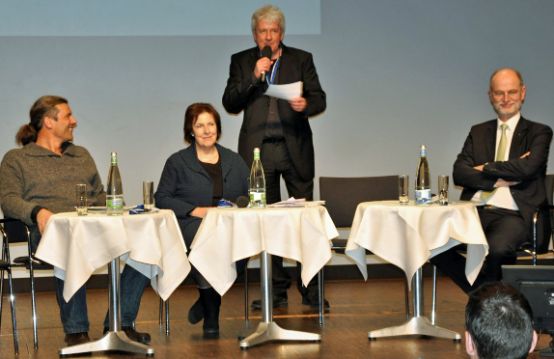
- Photo: Niklaus Rüegg
- Jodok Kobelt chaired all meetings until 2020 (except 2016).
- Panel discussion at the FMB 2011: from left Oskar Freysinger, Christine Egerszegi, Jodok Kobelt, Jean-Frédéric Jauslin
The transformer era I: in search of contradiction
There was no FMB 2009. The VMS Board decided to move the Forum from November, which was packed with events, to the "January slump" and at the same time to the new Trafo location in Baden. This meant that not much more than a year had passed since the last edition. Among the absolute highlights of the early Trafo years were the appearances of "day hiker" Daniel Fueter. He not only took part in several forums as a speaker and discussant, but also provided inimitable highlights with his linguistically and substantively perfect summaries of the day.
-
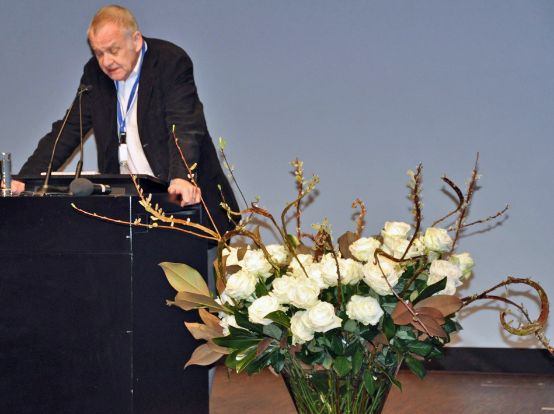
- Photo: Niklaus Rüegg
- "Day hiker" Daniel Fueter at the FMB 2011
The FMB 2010 was once again a little more political. Herzig wanted more controversial discussions and points of view, as he felt there had been too much agreement on the central topics in previous years. In this respect, the meeting between child psychiatrist Michael Winterhoff and pediatrician Remo Largo, who were based on different pedagogical principles, was very interesting. The political discussion with representatives of the Federal Office of Culture (BAK) was also controversial. Opinions were formed in view of the upcoming vote. The philosopher Georg Kohler took the discussion on the importance of music to a new level. The participants were then brought back down to earth by educational scientist Gerhard de Haan.
Things were even more political in 2011. A friend of music education was found in the person of Bernese cantonal councillor Bernhard Pulver. National Councillor Ruedi Noser opposed the initiative, BAK head Jean-Frédéric Jauslin was conciliatory, Christine Egerszegi put her foot down and SVP populist Oskar Freysinger was a self-promoter. Mr. Expo 02, Martin Heller, diagnosed politicians with a lack of courage when it came to financing cultural projects.
-
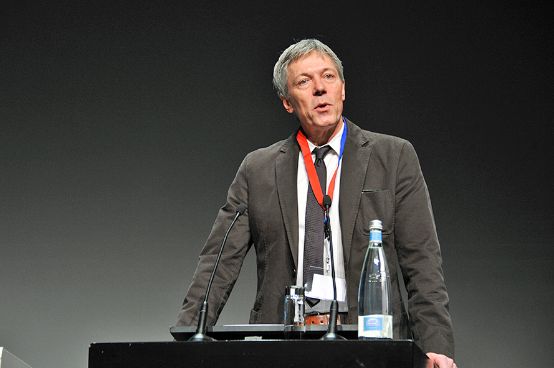
- Photo: Heiner Grieder/FMB/VMS
- Hector Herzig initiated the FMB in 2007 and chaired five conferences until 2012.
Hector Herzig stepped down as VMS President in 2012, and the fifth FMB was also the last under his leadership. Logically, it was dominated by the upcoming vote. A muted optimism about the medium-term effects of a future constitutional article was palpable. The greatest success of the conference was achieved by a speaker who was not even present. Neurobiologist Gerald Hüther had to cancel at short notice and instead showed an exciting video on the topic of "What we are and what we could be".
-
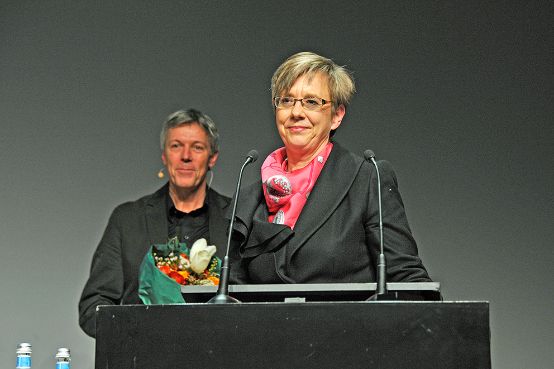
- Photo: Heiner Grieder/FMB/VMS
- Christine Bouvard takes over responsibility for the conference from Hector Herzig at the end of the FMB 2012.
The transformer era II: basic topics
With the handover of the baton to the new VMS President, Christine Bouvard Marty, and after winning the vote, the FMB took a two-year break to reflect. From then on, the work of the VMS Board focused on the implementation of the new Article 67a of the Constitution. The forums were increasingly devoted to the "grassroots" realities of music schools. Under the umbrella topic of "Keys to success", the FMB 2014 focused on the promotion of talented students - one of the topics now enshrined in the new constitution. Some of the speakers were vividly remembered: Graziella Contratto with her astute analyses, music psychologist Stefan Kölsch on the topic of musicality, educational scientist Annette Tettenborn on the process of "becoming gifted", Hacı-Halil Uslucan, Professor of Modern Turkish Studies, on the topic of musicality and migration. The President of Swiss Olympic, Jörg Schild, provided insights into the promotion of sport, enabled cross-comparisons and gave the music promoters new ideas. Helga Boldt presented a school financed by the Volkswagen Group, which was built on a "greenfield site" according to the latest educational principles.
For the first time, best practice projects from the music schools were presented in a large poster exhibition.
In 2016, the focus was on "Innovation and living change". Inventor Andreas Reinhard advocated a culture of error in education, educational researcher Malte Petersen explained the principle of intuitive learning and psychologist and guitarist Alan Guggenbühl revealed himself to be an opponent of purely output-oriented education. Timo Klemettinen gave an update on the Finnish education system and, finally, Hector Herzig presented the federal government's new broad-based support program, "jugend+musik".
Due to the positive experience with the best practice projects, this was expanded into a competition.
-
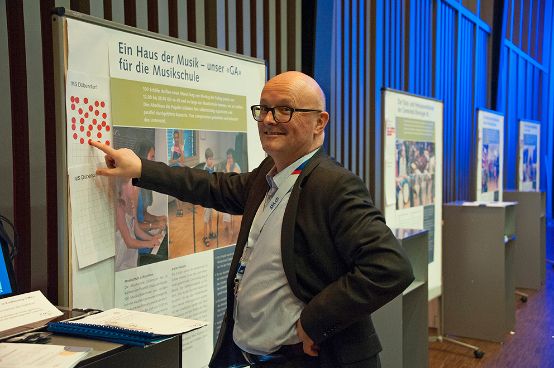
- Photo: Heiner Grieder/FMB/VMS
- Andreas Weidmann, then responsible for communication at VMS, at the FMB 2016.
- In 2016, FMB participants were able to evaluate the best-practice projects for the first time.
The future beckons
The last two forums - again at the Trafo - dealt with future scenarios. Under the title "Change: opportunity or threat?", the FMB 2018 looked at the influence of megatrends on music education. Age researcher Jonathan Bennett pointed out the increasing importance of older people in the teaching market, while sociologist Ueli Mäder diagnosed education with a relapse into mechanistic recipes. Joël Luc Cachelin called for a conscious and critical approach to digitalization. The German and Austrian music school worlds were presented by Michaela Hahn and Ulrich Rademacher. Andreas Doerne and Stefan Goeritz attracted a lot of attention with their presentation of a music school as a "place of learning". In the best practice competition, participants were able to take part in the selection of the best. The stunning duo Calva provided a witty counterpoint.
The most recent FMB 2020 looked for "Paths to the goal" and "Opportunities for a changing society". Political issues took on a greater significance as the preliminary consultations for the new Culture Dispatch (2021-2024) entered the decisive phase. Educational scientist Max Fuchs spoke about a "human right to music", National Councillor Markus Ritter revealed tricks on how to be politically successful in Bern, David Vitali from the BAK explained the planned implementation of the promotion of talent (constitutional article 67a, para. 3) and start-up founder Jan Rihak presented his web-based teaching app. The highlight of the conference was undoubtedly the presentation by sociologist Armin Nassehi. He posed the question: "For which problem is digitalization the solution?" and put digitality on a par with epochal achievements such as the printing press or the steam engine. We can look forward to the next edition in January 2023 under the aegis of the new VMS President Philippe Krüttli.






